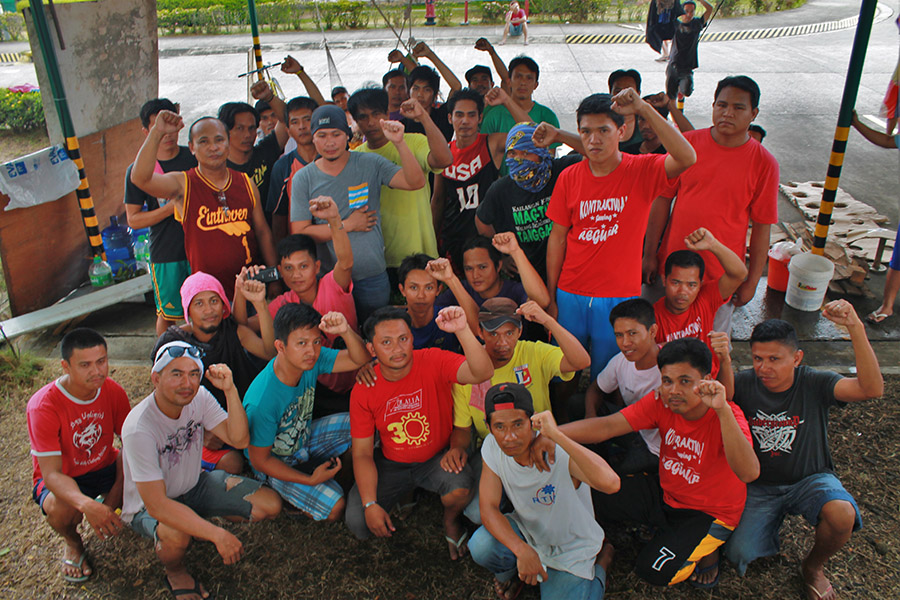Incoming president Rodrigo Duterte said during the electoral campaign that contractualization is one of the first things that his administration will end. Does his statement mean that there is a ray of hope for contractual workers currently battling for their right to be regularized?
Manila Cordage Company (MCC) and Manco Synthetics Incorporated (MSI) in Cabuyao, Laguna are two different companies under the same management. They produce nylon ropes and abaca used in several industries. Workers here have been contractual for the past five to eight years. Under the scheme of contractualization, companies avoid the employer-employee relationship and instead fire and re-hire workers after six months. The vicious cycle—allowed under the Herrera Law—goes on and on.
Strike of contractual workers
The workers of MCC and MSI are currently in a strike to fight for employee regularization and recognition of their formed unions. The factory has been on lockdown since May 4.
These workers receive P315 a day, less than the minimum wage. “Napakababa ng sahod talaga. Wala pang benepisyo. Pagdating din sa usaping benepisyo tulad ng Social Security, PAG-IBIG at PhilHealth, hindi rin nila hinuhulog,” said Dexter Masilungan, president of MCC’s union.
Although the company is required by law to provide their workers Personal Protective Equipment (PPE), the workers still solely provide for themselves. “Lahat yan, sapatos, gloves, ultimo gunting na ginagamit namin pangggupit ng nylon, kami pa ang nagpro-provide,” said William Pabilonia, a worker of MCC for eight years.
Many workers have accidentally cut their fingers and been severely injured in workplace accidents. But they often don’t receive assistance. Whenever they get injured, the company says that they are not entitled to medical benefits.
MCC and MSI workers are putting their lives at risk in exchange for little pay. But whatever physical pain caused by workplace injuries is nothing compared to the psychological pain of unjust treatment by their employers, they say.
“Ang turing sa amin diyan sa kumpanya parang makinarya lang din nila. Napapalitan agad agad at kung kailan nila gusto. Minsan kinakailangan pang mag-overtime kahit tapos na ang trabaho mo,” Pabilonia said.

Forming a union
The workers waited a long time for the promise of regularization from MCC and MSI management. But it never came. They eventually got tired of waiting and came up with their last resort: forming a union.
“Bakit kailangan pang by batch (ang pag-regularize)? Dapat noon pa lang, kung magre-regular sila ng paisa-isa, dapat sinimulan na agad nila para sa ngayon, tapos na sana. Kasalanan nila ‘yun,” said Brando Emias, president of MSI’s union.
Whether workers are regular or not, a unions is their only weapon to advance their rights against exploitation and abuse. It is also a venue for them to voice out their woes and grievances. But instead of recognizing the unions, MCC and MSI management threatened and even dismissed several of the workers.
“Noong nalaman nilang nagtayo kami ng unyon, nagtanggal sila ng ilan sa kasamahan namin. Para bang nananakot na at ipinaparamdam na wala kaming karapatang magtayo ng unyon,” Emias further said.
They launched their strike and set up the workers’ picketline in early May. Recently, the management cut off their water supply. For them, this is a warning from the management that the worst is yet to come.
But they will not back down from their battle for regularization and the right to form a union. In fact, they have become more determined than ever to stop the unfair labor practices of the two companies through the strike.
“Kahit anong gawin nila sa amin, hindi kami aalis dito,” Masilungan said.
Skeptical but hopeful
Although a bit skeptical about Duterte’s promise to end contractualization, worker Antonio Eco wishes that it pushes through. “Marami na ang nangako niyan na presidente na alisin ang contractualization. Sana ‘pag naupo si Duterte ay tuluyan nang mawala ‘yan upang maging regular na kaming manggagawa,” he said.
Eco said that contractualization wreaks havoc on their lives and families. “Sa tuwing tinatanggal kami sa trabaho, nangangamba kami na wala kaming maipakain sa aming pamilya. Dapat talaga ay gawin na kaming regular dahil halos walong taon na kaming naninilbihan diyan sa kumpanya,” he added.
According to labor groups, contractualization should be abolished. Because as long as it is provided for under the law, capitalist employers will find a way to implement the scheme, while Filipino workers continue to suffer.
Indeed, he promise of ending contractualization is one that Duterte will be challenged by many workers to keep.
Report by Natasha Dimaculangan and Wilgin Soriano

![Incoming president Rodrigo Duterte said during the electoral campaign that contractualization is one of the first things that his administration will end. Does his statement mean that there is a ray of hope for contractual workers currently battling for their right to be regularized? Manila Cordage Company (MCC) and Manco Synthetics Incorporated (MSI) in Cabuyao, […]](https://www.altermidya.net/wp-content/uploads/2019/09/MCC-MSI-strike2-900x600.jpg)








0 Comments